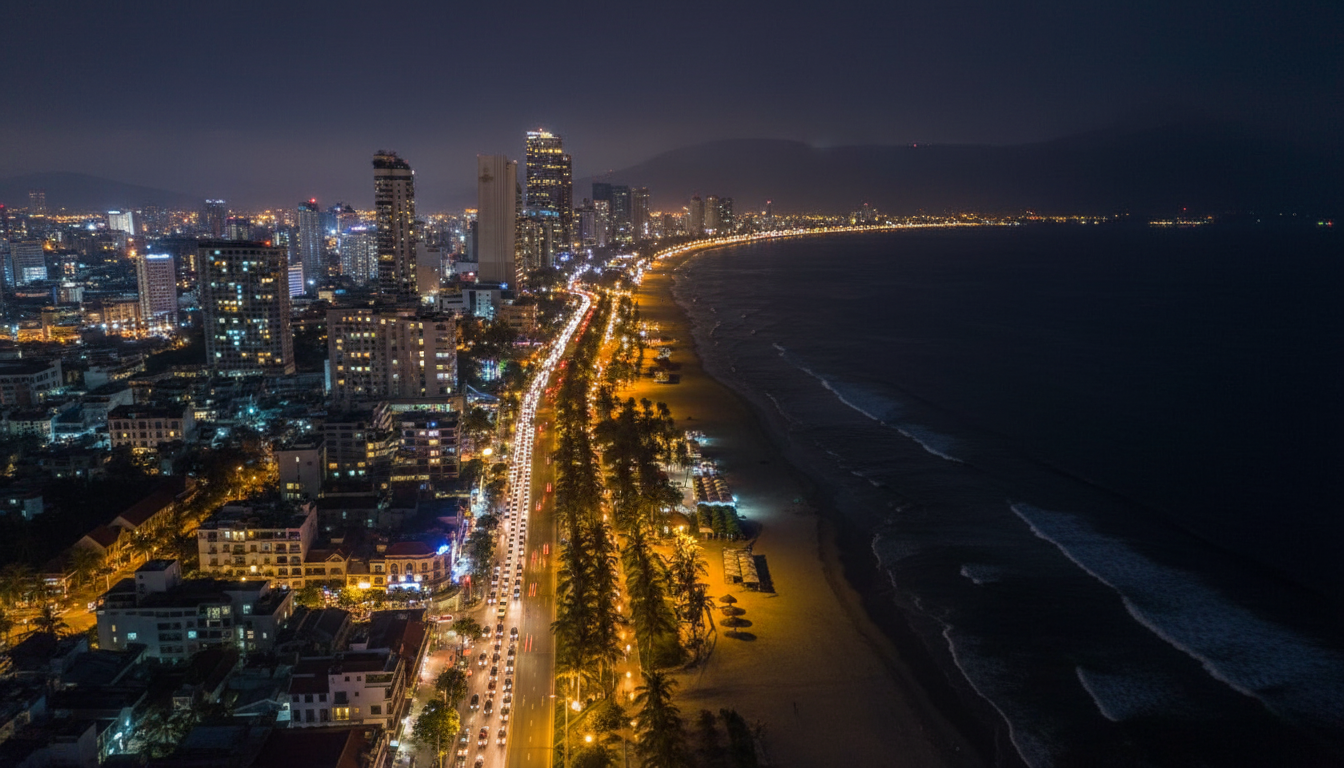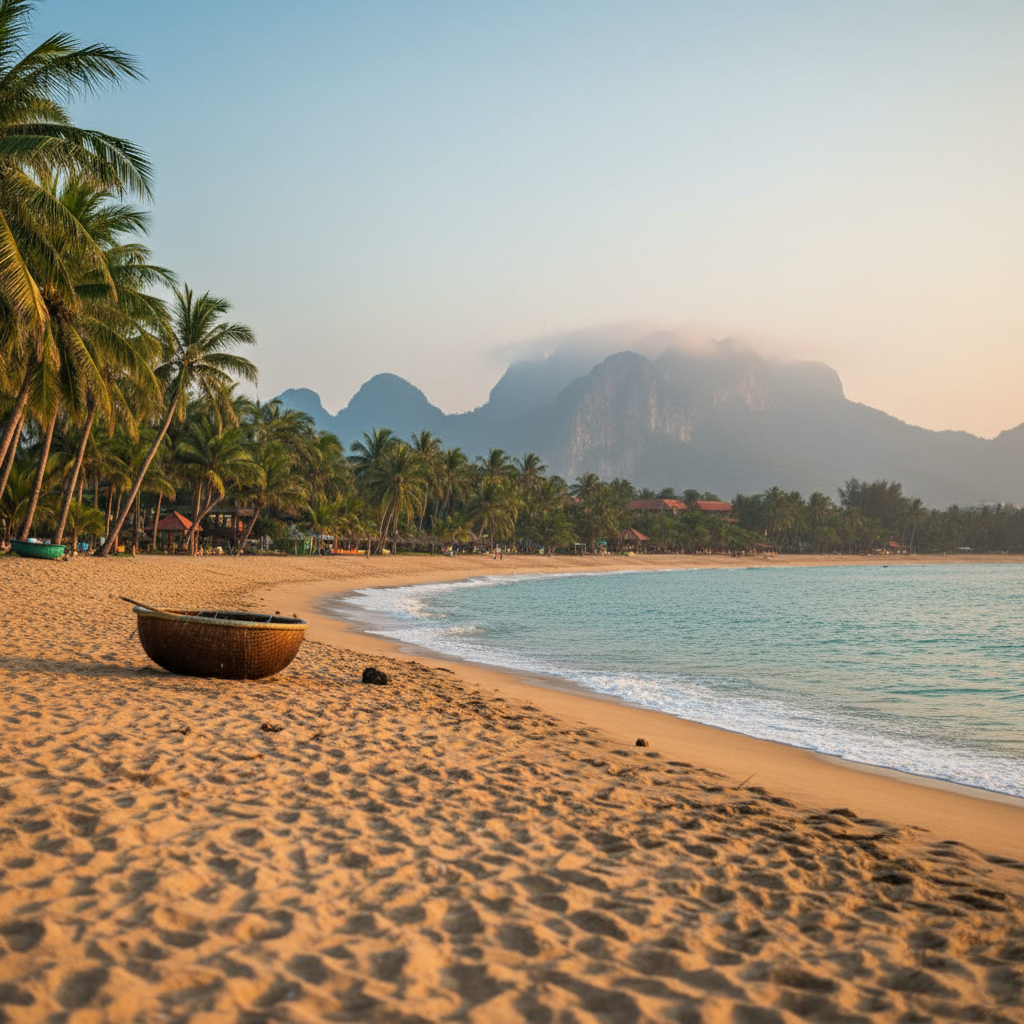
Da Nang: Vietnam's Digital Nomad Paradise Between the Mountains and the Sea
I'll be honest—when I first landed in Da Nang, I expected to stay for a week, maybe two. That was eight months ago. There's something about this coastal city that makes you cancel your next flight and extend your Airbnb, again and again.
If you're a digital nomad weighing your options in Southeast Asia, let me tell you why Da Nang deserves to be at the top of your list.
Why Da Nang Just Works
Da Nang sits in that sweet spot between "undiscovered gem" and "has everything you need." It's Vietnam's third-largest city, but it doesn't feel overwhelming like Hanoi or Ho Chi Minh City. Instead, you get wide boulevards, clean streets, and a manageable pace that lets you actually get work done.
The city hugs a stunning stretch of coastline with My Khe Beach—which the US military apparently called "China Beach" during the war. These days, it's where you'll find me most mornings, laptop perched on a beachfront café table, wondering why I ever worked from a windowless office.

The Internet Situation (Because Let's Get Real)
Let's talk about what really matters: can you actually work here? The short answer is yes, absolutely. Most cafés and coworking spaces have fiber internet ranging from 50-100 Mbps, which is more than enough for video calls, uploads, and streaming your comfort show after hours.
I've been running Zoom meetings from various spots around the city for months without major issues. The occasional power outage happens during monsoon season, but having a backup café or two in your rotation solves that problem. My apartment has 100 Mbps fiber for about $10 a month.
Coworking Spaces and Work-Friendly Cafés
The coworking scene here is growing but still intimate. Enouvo Space near An Thuong Beach is popular with the digital nomad crowd—around $80-100 for a monthly membership. It's got reliable AC (crucial in summer), standing desks, and a community of other remote workers who actually want to be social.
But honestly? Some of my most productive days happen in cafés. Cong Caphe locations are everywhere and have strong wifi and good coffee for under $2. The 43 Factory Coffee Roaster is my go-to when I need to really focus—industrial vibes, excellent flat whites, and other people clearly deep in the work zone.

For something more local, the Vietnamese café culture is alive and well here. You can post up at a sidewalk café with a cà phê sữa đá (Vietnamese iced coffee) for less than a dollar and work for hours. The locals might look at you curiously at first, but they're incredibly welcoming.
Cost of Living: Your Money Goes Far
Here's where Da Nang really shines. My fully furnished one-bedroom apartment in the An Thuong area, five minutes from the beach, costs me $400 a month. That includes a kitchen, washing machine, and a balcony where I watch the sun set over the mountains.
For food, you have options. Street food meals run $1-3, and you can eat incredibly well. A big bowl of mi quang (local specialty noodles) or bun cha ca (fish cake noodle soup) costs about $1.50. When you want Western food or something fancier, expect $5-10 for a meal at a nice restaurant.
My monthly budget breaks down roughly like this:
Rent: $400
Food: $300 (eating out most meals, mix of local and Western)
Coworking/cafés: $100
Motorbike rental: $50
Gym: $30
Phone/Internet: $15
Everything else: $200
So I'm living very comfortably on around $1,100-1,200 a month. You could absolutely do it cheaper if you eat mostly local food and skip the coworking space.
Getting Around
Most digital nomads here rent a motorbike—it's the easiest way to get around and costs $40-60 a month. The city isn't too chaotic by Vietnamese standards, though you'll want to be confident on two wheels. Grab (Southeast Asia's Uber) is everywhere and cheap if you don't want to deal with the traffic.
The city is also surprisingly bikeable along the beach road, and walking is pleasant in most neighborhoods, especially An Thuong and My An.
The Community
The digital nomad community in Da Nang is growing but still feels manageable. It's not a scene where everyone's trying to out-hustle each other or pitch their startup at every meetup. People are friendly, down-to-earth, and actually interested in work-life balance.
You'll find regular meetups organized through Facebook groups and coworking spaces. There's also a solid expat community that's been here longer term, plus English-speaking locals who work in tech and are happy to show you around.
Weather and When to Visit
Da Nang has two main seasons. February to August is dry and hot—beautiful beach weather but can get scorching in June and July. September to January is the rainy season, which means humidity, occasional typhoons, and grey days. The rain usually comes in bursts rather than all day, but October and November can be properly wet.
Most digital nomads I know come for the dry season and either stay through the rain or head somewhere else for a few months. I stayed through last year's rainy season and honestly, it wasn't as bad as people warned—just have a good rain jacket and flexible work schedule for the really stormy days.
Day Trips and Weekend Adventures
One of Da Nang's biggest advantages is location. Hoi An, the ancient trading port turned tourist magnet, is a 40-minute ride away. It's beautiful but crowded—I prefer to visit early morning before the tour buses arrive.
The Hai Van Pass, one of the most scenic coastal roads in the world, is right there. Rent a motorbike and spend a day riding through the clouds with the ocean on one side and jungle on the other.
Ba Na Hills (with the famous Golden Bridge held by giant stone hands) is an hour away, though it's honestly a bit too Disney-esque for my taste. The Marble Mountains are closer and offer temples, caves, and views without the crowds.
For a proper weekend trip, Hue is 2.5 hours north and still feels like a sleepy imperial city. Quy Nhon to the south is a less-discovered beach town perfect for a quiet few days.

Food Scene
Vietnamese food in Da Nang hits different. The central region has its own distinct cuisine—mi quang is the local noodle dish you need to try, with its turmeric-yellow noodles and mountains of herbs. Banh xeo (crispy rice pancakes) here are smaller and crispier than in the south.
The night markets and street food scene are incredible. My go-to is the corner near the Han Market around 6 PM when the vendors set up—fresh grilled seafood, banh mi, and every noodle soup variant you can imagine.
For Western food, the An Thuong area has everything from Italian to Mexican to burgers. It's not quite Bangkok-level international food, but you won't suffer.
The Challenges (Because It's Not All Perfect)
Let's be real for a second. Da Nang isn't for everyone. The language barrier is significant—fewer people speak English here compared to Bangkok or Bali. Google Translate becomes your best friend for anything beyond basic interactions.
The city is also still developing its infrastructure for foreigners. Opening a local bank account is a bureaucratic nightmare. Finding apartments requires either Vietnamese friends or dealing with sometimes-sketchy agents on Facebook.
The rainy season is genuinely challenging if you're used to constant sunshine. And while the pollution isn't Bangkok-level, the air quality can get rough during dry season.
Culturally, it's more conservative than Chiang Mai or Canggu. The local nightlife isn't huge, and the digital nomad scene is smaller. If you need a massive community of other remote workers, somewhere like Bali might suit you better.
Visa Situation
Vietnam recently updated their visa policies, which is excellent news for digital nomads. You can get a 90-day e-visa relatively easily, and there are options for extending or doing visa runs to nearby countries. Many people do quick trips to Thailand or Cambodia to reset their visas.
It's worth noting that officially, you're not supposed to work on a tourist visa, but digital nomad remote work is a grey area everywhere. Just be mindful and professional.
My Honest Take
Da Nang won't give you the Instagram-perfect rice terraces or the party scene of other Southeast Asian hotspots. What it gives you instead is a real city where you can actually live and work, not just pass through.
It's a place where you can swim before breakfast, work through the morning at a beachfront café, grab a $2 lunch that's genuinely delicious, and finish your workday watching the sunset from a rooftop bar—all while spending less than you would on rent alone in most Western cities.
The digital nomad infrastructure is still developing, which means you're getting in early before it becomes the next "it" destination. It's Vietnam, but accessible. It's busy, but not overwhelming. It's affordable, but increasingly comfortable.
If you're the type of digital nomad who wants authentic Asian experiences, great food, and a productive work environment without paying Bali prices or dealing with Bangkok traffic, Da Nang might just be your next base. Just book a one-way ticket. Something tells me you'll be extending your stay too.